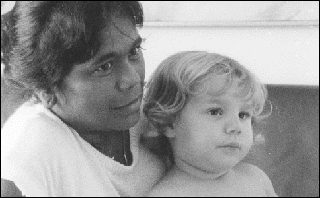|
|
| Director, Editing: Nilita Vachani Photography: Vangelis Kalambakas Music: Ross Daly Sound: K. Nandha Kumar, Costas Poulantzas Producers: Nilita Vachani, Vangelis Kalambakas Production Company, Source: Film Sixteen 437-39 Acharnon, 11143 Athens, GREECE Phone: 30-1-218-5535 / Fax: 30-1-218-5535 E-mail: vachani@hol.gr INDIA, GREECE, GERMANY / 1995 / Sinhala, English / Color / 16mm / 107 min |
Studied English literature at Delhi University and then took a Master's in Communications from the Annenberg School of Communications, University of Pennsylvania and a Master of Fine Arts in Filmmaking from the Art Institute of Chicago. From 1985 to 1987 she worked in New York as a documentary film editor. She was assistant director to Mira Nair on Salaam Bombay., and has directed, produced and edited three international award winning documentaries, Eyes of Stone (1990), Diamonds in a Vegetable Market (1992) and When Mother Comes Home for Christmas... (1995). She is now teaching a documentary film workshop at the University of Pennsylvania. |
 |
|
|
After eight years of absence, a Sri Lankan woman working in Greece returns home for Christmas. Her three children await her. Her eldest son has made a rather comfortable life for himself
with a bus acquired by means of money she sent home, but her eldest
daughter marries in haste to escape her unpleasant life. The youngest
boy, whose care is entrusted to a boarding school (also an orphanage),
is clearly going through some problems. As the film progresses we come to detect a familiar problem and
begin to feel an intimacy with Josephine, this woman from a distant
and foreign country whose circumstances at first glance are so
different from our own. |
|
|
|
Director's Statement On the stage of global economies, at no time are the effects of
the laws of supply and demand more keenly felt as when the commodity
is the human being. |
